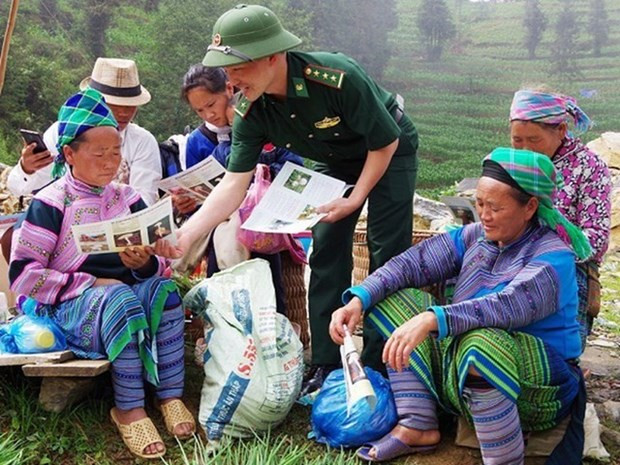 |
| Communication work has been carried out to raise public awareness about human trafficking. Photo daidoanket.vn |
Consistent with the viewpoint on facilitating safe, orderly and regular migration, and resolutely combating illegal migration, the Vietnamese government has regarded the fight against illegal migration and human trafficking a regular and long-term political task.
This task should be performed proactively with the close coordination of the international community.
In August 2022, 42 Vietnamese in Sampeou Poun Commune, Kaoh Thom District, Cambodia's Kandal Province, fled the casino where they worked and swam across Binh Di River to return home.
The group confessed that they had illegally entered Cambodia through Việt Nam’s southern border provinces to work at the casino. They were forced to work overtime without any payment, so they sought ways to return home illegally.
The case has raised alarms over the fact that quite a few Vietnamese people have been scammed by job offers and promises of “easy jobs and high salaries”.
In this regard, Deputy Spokesperson of the Ministry of Foreign Affairs Phạm Thu Hằng told the press that Việt Nam had taken action against human trafficking, and implemented the programme on anti-human trafficking for 2021 - 2025, with a vision to 2030, with new solutions and tasks to prevent human trafficking in all fields.
The law on Vietnamese guest workers under contracts had been put into effect since January 1, 2022, aiming to protect the legal and legitimate rights and interests of the labourers and prevent human trafficking.
The UN had identified human trafficking as one of the four most dangerous crimes included in the Global Crime Prevention Programme. Việt Nam had also designated July 30 as National Anti-Human Trafficking Day.
Enhancing international cooperation
Hằng stressed that Việt Nam was making efforts to materialise the Global Compact for Safe, Orderly and Regular Migration in line with the Prime Minister’s Plan dated March 20, 2020, in order to create a transparent migration environment, protect legal rights and interests of migrants, and prevent the risks of human trafficking in international migration activities.
According to the International Labour Organisation (ILO), migrant workers, who play a crucial role in the global economy, are over three times more likely to be in forced labour than non-migrant adult workers.
Therefore, Việt Nam has closely cooperated with the international community in preventing forms of human trafficking and illegal migration.
In an interview granted to the Vietnam News Agency (VNA) as part of his recent visit to Việt Nam, UK's Migration and Modern Slavery Envoy Andrew Patrick said with the scale and intensive and extensive impacts of the issue, the fight would require joint efforts and reforms globally, including Việt Nam.
He noted that Việt Nam and the UK were working very closely in promoting safe migration and preventing human trafficking.
The two countries shared the common goal of encouraging legal migration, and they “have good cooperation” in this regard, he added.
“More broadly, we are looking towards working with Việt Nam when it joins the United Nations Human Rights Council,” the envoy said.
The UK, as a friendly country, together with the International Organisation of Migration (IOM) and others, was helping Việt Nam materialise its plan for the implementation of the UN’s Global Compact for Safe, Orderly and Regular Migration, he continued.
Doyen Yun, Head of Projects and Partnerships at the IOM, told the VNA that the UK’s Modern Slavery Fund helped the organisation and its partners in Việt Nam address modern slavery and human trafficking.
It was aligned with priorities set under Việt Nam’s programme on human trafficking prevention and combat during 2021-2025, she added.
Yun highlighted the “strong” bilateral relationship between the governments of Việt Nam and the UK, taking the “Tackling modern slavery in Việt Nam” (TMSV) project as an example.
The project is an interagency partnership initiative working with Vietnamese government and local actors to realise their potential to reduce individual and community vulnerabilities to modern slavery including human trafficking through behaviour change communication, strengthened access to justice and victim-centred rehabilitation and reintegration support.
Between 2018 and 2022, the project capacitated 1,782 counter-trafficking actors, with 425 for prevention, 392 for prosecution, and 965 for protection, raised the awareness of over 2.93 million people about human trafficking prevention and safe migration, and helped 1,680 people gain access to local employment opportunities and regular labour migration pathways.
As Việt Nam is a developing country with high human development status, apart from the protection perspective, their activities have been linked with the country’s sustainable development, according to Yun.
Regarding the TMSV, Deputy Chief of the Office of the Ministry of Public Security Colonel Nguyễn Hồng Nguyên said the project was intended to concretise the content that the Vietnamese Government, ministries and agencies had committed in the three areas of prevention, prosecution and protection.
During the 2018-2021 period, thanks to the instruction of the ministry’s leaders, the close, concerted coordination between donors, agencies and localities, especially the drastic engagement of the five targeted cities and provinces of Quảng Ninh, Hải Phòng, Nghệ An, Hà Tĩnh and Quảng Bình, the project was implemented on schedule and produced significant outcomes in all the three aspects.
Nguyên said that behaviour change campaigns, which aim to prevent vulnerable groups from becoming human trafficking victims, had been carried out concertedly, effectively and substantively in the localities through diverse forms.
The project also helped accelerate the investigation, prosecution and handling of cases as well as law enforcement in human trafficking prevention and control.
Multiple activities to support, verify and identify victims and others vulnerable to being trafficked had been carried out in line with Vietnamese regulations. Through such activities, many had received relief aid and livelihood assistance. VNS